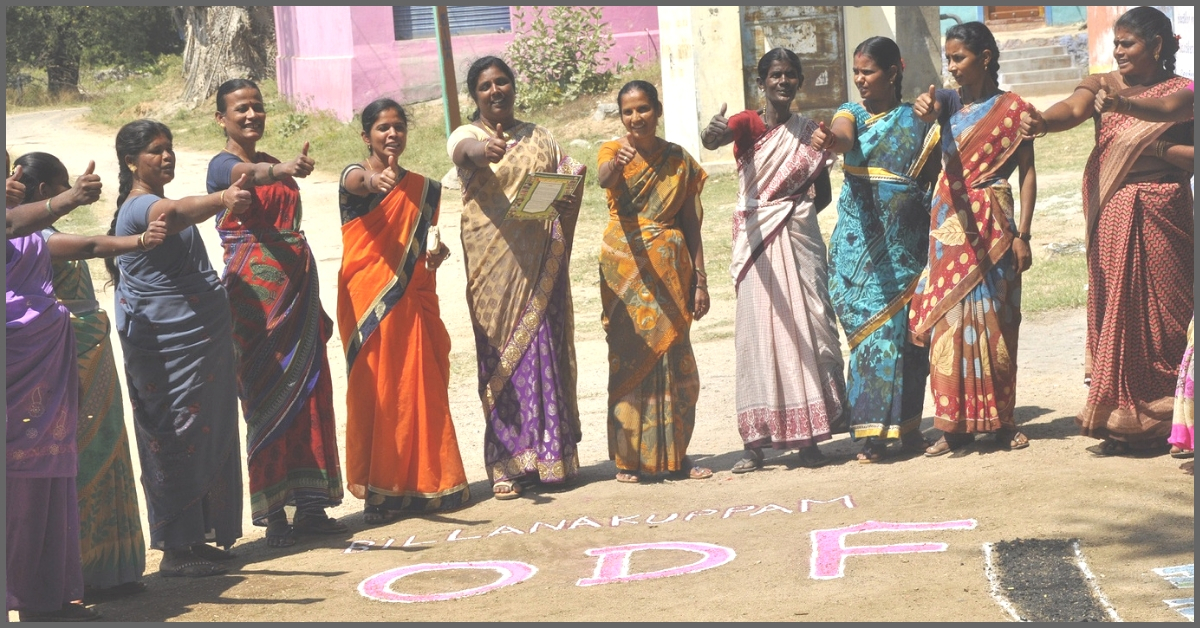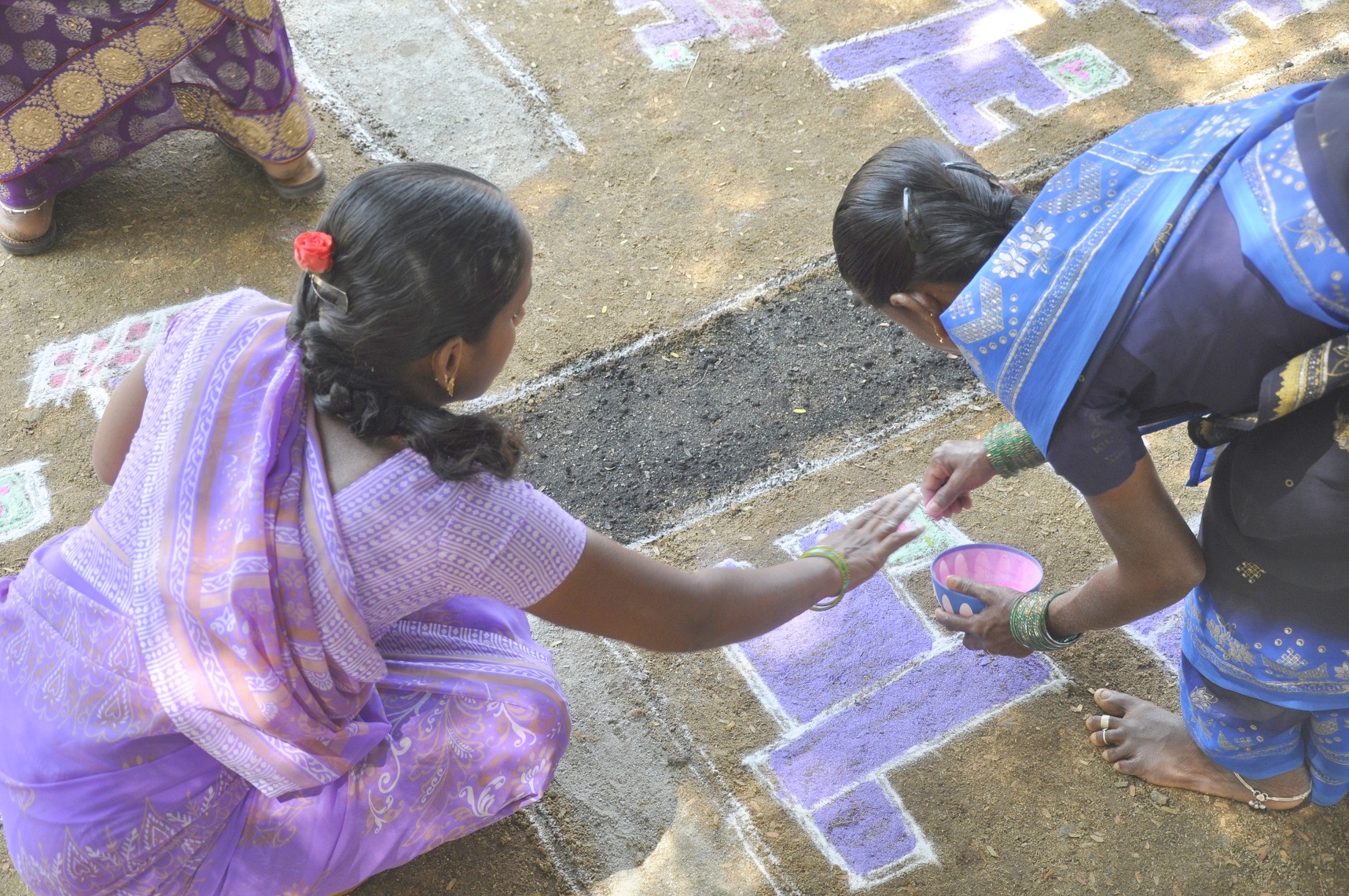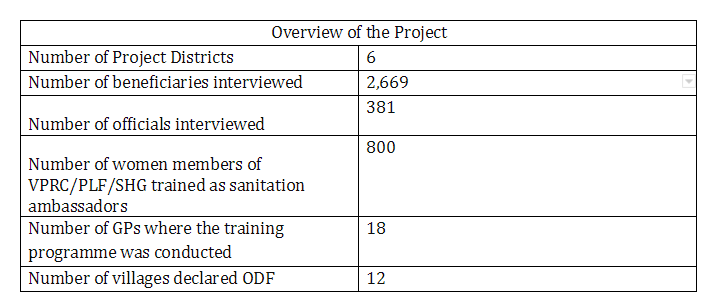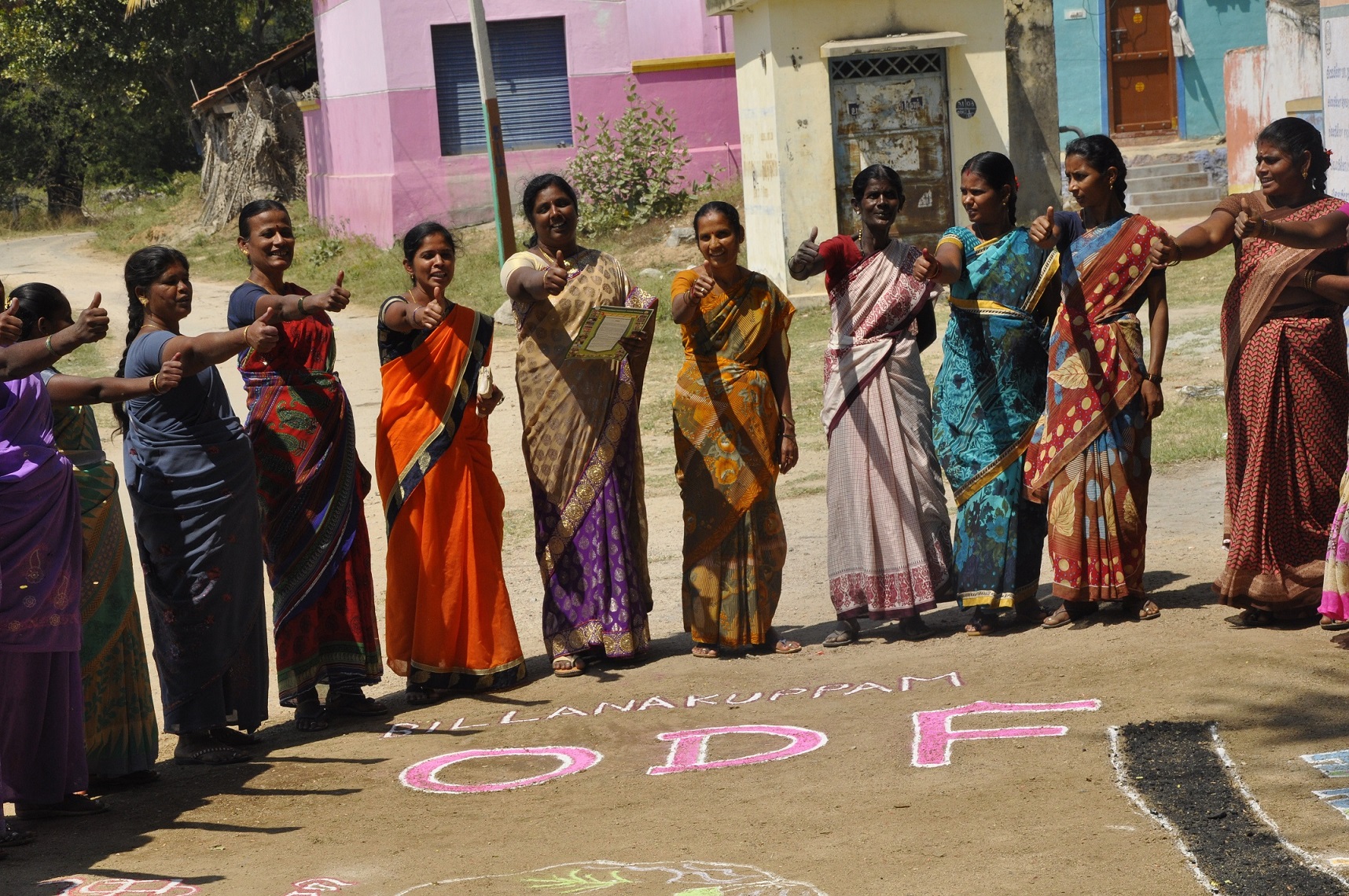How Women Played a Huge Role in Making 12 TN Villages Open Defecation Free
Women in these groups have taken it upon themselves to spread the message of sanitation. They speak about the hazards of open defecation and convince households to construct and use toilets.

As four years of the Swachh Bharat Mission (SBM) come to an end, it is time to reflect and take stock of how far we have come and what lies ahead.
As per the latest government figures, the overall sanitation coverage in India has now risen to more than 90% (SBM, 2018). However, the data also shows that the physical construction of a toilet does not guarantee its usage or a change in sanitation practices.
There are enough instances that show toilets constructed under SBM (G) are being used to store firewood or even as a cattle shed. It is also not uncommon for beneficiaries of SBM (G) to use toilets only at night or during the monsoons due to the misbelief that using it often would fill up the pit soon. Many men continue to resort to open defecation as they believe toilets are meant to be used only by women and children.
The journey of the Swachh Bharat Mission has brought forth many stories and lessons in sanitation that need to be recognised and taken forward.
The intervention of the Public Affairs Centre
In a recently completed project on ‘Improving Consumer Voices in Swachh Bharat Mission (Gramin)’, Public Affairs Centre (a leading think-tank based in Bengaluru) used its repertoire of social accountability tools to assess the experience of the beneficiaries from different aspects of the programme (selection, application, toilet construction, receipt of subsidy amount, usage) in Tamil Nadu.
The project deployed Community Score Cards (CSC)–a citizen-centric accountability tool for the assessment, planning, monitoring and evaluation of service delivery.
The CSC was used to gather feedback from communities of users and service implementers to improve communication between them, as scores on various indicators. The idea was to form Joint Action Committees (JAC), comprising beneficiaries and service providers that implemented mutually agreed upon Joint Action Plans (JAP), ensuring the smooth implementation of SBM in the six districts of Tamil Nadu (Dharmapuri, Kanyakumari, Krishnagiri, Perambalur, Tirunelveli and Tiruchirappalli).
Role of Women and the Importance of Community Participation

In the six districts, the main reason cited for the construction of toilets by more than 70% beneficiaries of SBM was to ensure the safety of women (Citizen Report Card Survey, PAC). During our interaction with district-level officials, nearly 60% of them reported that women helped in creating the demand and awareness for a toilet in the community.
The role of ‘Swachhata Doots’ as grassroots sanitation ambassadors to take forth the message on the importance of toilet construction and hygienic sanitation practices is also well acknowledged in the SBM policy.
During the project and fieldwork, the PAC research team realised that these districts already had an active base of foot soldiers – Village Poverty Reduction Committee (VPRC), Panchayat Level Federation (PLF) and Self Help Groups (SHG) – dominated by nearly 800 women in the study areas.
Further, it was found that the interest of these women could be leveraged to proceed with the planned intervention.
Thus, identifying these women as change agents, PAC undertook the following activities:
- Screened films and documentaries on different aspects of sanitation (the ill effects of open defecation and hygiene practices).
- Conducted group discussions for VPRC, SHG and PLF members and district officials on learnings, problems and resolutions w.r.t implementation of SBM.
- Developed and distributed IEC material with a specific focus on the disadvantages of open defecation, the technical aspects of toilet construction and faecal sludge management among VPRC, SHG and PLF members.
- Trained VPRC, PLF and SHG members in every village to work closely with every household to ensure the community achieves and sustains its OPF status.
Such targeted interventions helped build capacities among these ‘sanitation ambassadors’, and they became our foot soldiers of change. They used their network to influence households to construct and use toilets within their communities.
Today, women in these groups have taken it upon themselves to spread the message of sanitation. They speak about the hazards of open defecation and convince households to construct and use toilets.
The villages where this intervention was made saw a significant increase in the demand for toilets as well as increased usage. Twelve of these villages have been declared open defecation free.
In Billanakupam Gram Panchayat alone, the number of toilets increased from 335 to 855 after the involvement of the women.

In Maharashtra, women who raised their voice against open defecation and highlighted their sanitation needs were named ‘Swachhata Doots’.
Even states such as Uttar Pradesh which had very high levels of open defecation, to begin with, have recognised the role women can play as ambassadors of sanitation. In the recently organised ‘Swachh Shakti’ Convention where 8,000 Women Sarpanches, 3,000 Women Swachhagrahis, 2,000 Mahila Samakhyas from the state were invited for their outstanding contribution towards open defecation free India.
In a recent event, even Prime Minister Narendra Modi said that the contribution of India’s Nari Shakti (women power) in the Swachh Bharat Mission was immense.

As we celebrate Gandhi’s 149th birth anniversary this year and are just one year short of marking the ODF target of 2019, it is imperative to recollect what he said about the role women can play in any form of social progress. Gandhiji envisaged an important role for women vis-a-vis the power structure in society and the foundations of an equitable and non-violent social order.
You May Also Like: Meet the Ex-IAS Officer Who Left America to Head the Swachh Bharat Mission!
Thus, an important lesson to ensure the last mile delivery of the ‘Swachh Bharat Mission’ and the transformation of sanitation practices (from open defecation to toilet usage) is to recognise and leverage women-led groups and institutions within the communities.
(Edited by Shruti Singhal)
Like this story? Or have something to share?
Write to us: [email protected].
Connect with us on Facebook and Twitter.
If you found our stories insightful, informative, or even just enjoyable, we invite you to consider making a voluntary payment to support the work we do at The Better India. Your contribution helps us continue producing quality content that educates, inspires, and drives positive change.
Choose one of the payment options below for your contribution-
By paying for the stories you value, you directly contribute to sustaining our efforts focused on making a difference in the world. Together, let’s ensure that impactful stories continue to be told and shared, enriching lives and communities alike.
Thank you for your support. Here are some frequently asked questions you might find helpful to know why you are contributing?


This story made me
-
97
-
121
-
89
-
167













